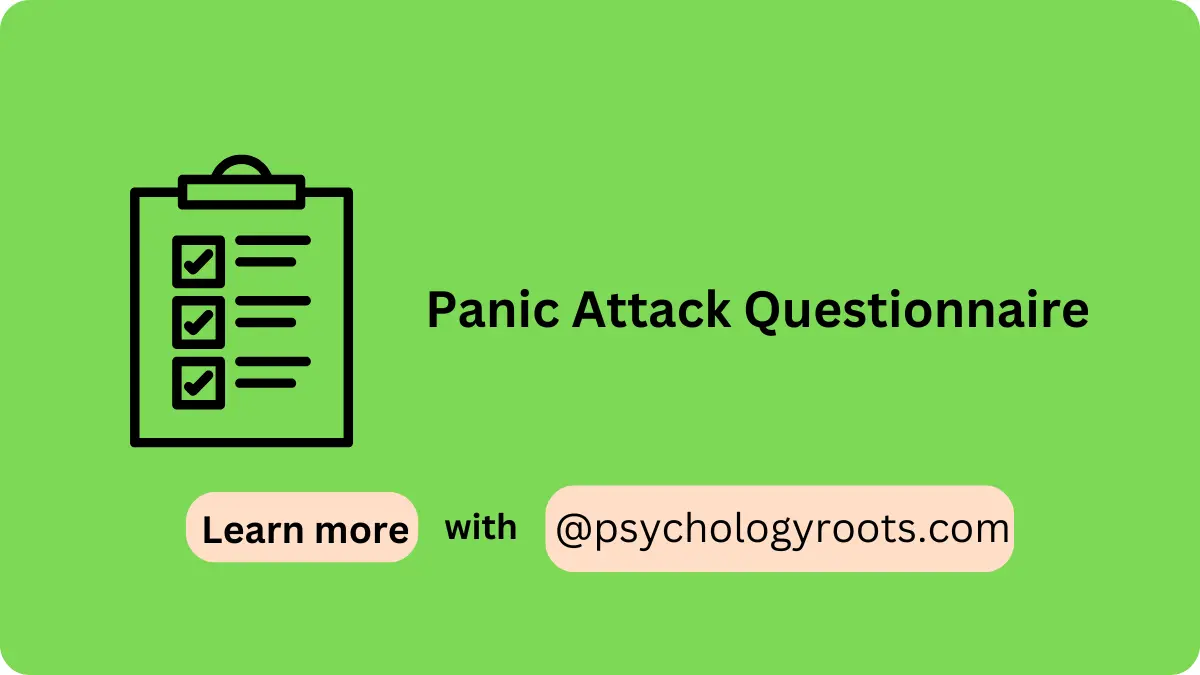Table of Contents
Panic Attack Questionnaire
Here in this post, we are sharing the “Panic Attack Questionnaire”. You can read psychometric and Author information. We have thousands of Scales and questionnaires in our collection (See Scales and Questionnaires). You can demand us any scale and questionnaires related to psychology through our community, and we will provide you with a short time. Keep visiting Psychology Roots.
About Panic Attack Questionnaire
Scale Name
Panic Attack Questionnaire
Author Details
Norton, G. R., Harrison, B., Hauch, J., & Rhodes, L.
Translation Availability
English

Background/Description
The Panic Attack Questionnaire (PAQ) is a self-report tool designed to assess the frequency, characteristics, and severity of panic attacks. Developed by Norton et al. (1985), it is instrumental in understanding the cognitive, physiological, and situational factors associated with panic episodes. The PAQ is widely used in clinical and research settings to evaluate panic disorder and related conditions, as well as to monitor treatment progress.
The questionnaire assesses:
- Symptoms: Identifies physical sensations and emotional experiences during panic attacks.
- Triggers: Explores environmental or cognitive factors leading to episodes.
- Frequency and Duration: Captures the prevalence and time span of panic attacks.
- Impact: Evaluates the effect of panic attacks on daily functioning and quality of life.
Administration, Scoring and Interpretation
- Obtain the PAQ: Ensure the respondent receives a valid and reliable version of the questionnaire.
- Define the Purpose: Use the tool for clinical diagnosis, research, or treatment planning.
- Provide Instructions: Explain the purpose of the questionnaire. Emphasize the need for honest and accurate responses.
- Administer the Questionnaire: The PAQ is typically self-administered and takes 10–20 minutes to complete. Respondents answer questions about their panic attack experiences, including symptoms, frequency, and situational triggers.
Reliability and Validity
The original PAQ demonstrated strong internal consistency and test-retest reliability in studies by Norton et al. (1985). The questionnaire has shown good construct and criterion validity, correlating well with other measures of panic and anxiety.
Available Versions
Multiple-Items
Reference
Norton, G. R., Harrison, B., Hauch, J., & Rhodes, L. (1985). Characteristics of people with infrequent panic attacks. Journal of abnormal psychology, 94(2), 216–221. https://doi.org/10.1037//0021-843x.94.2.216
Important Link
Scale File:
Frequently Asked Questions
What is the purpose of the PAQ?
To evaluate the characteristics, frequency, and impact of panic attacks.
How long does it take to complete the PAQ?
Approximately 10–20 minutes.
Can the PAQ be used for diagnosing panic disorder?
Yes, it is often used as part of a comprehensive assessment for panic disorder.
What does a higher score on the PAQ indicate?
Higher scores reflect greater severity or frequency of panic attacks.
Who can administer the PAQ?
It is self-administered but typically reviewed by mental health professionals.
Disclaimer
Please note that Psychology Roots does not have the right to grant permission for the use of any psychological scales or assessments listed on its website. To use any scale or assessment, you must obtain permission directly from the author or translator of the tool. Psychology Roots provides information about various tools and their administration procedures, but it is your responsibility to obtain proper permissions before using any scale or assessment. If you need further information about an author’s contact details, please submit a query to the Psychology Roots team.
Help Us Improve This Article
Have you discovered an inaccuracy? We put out great effort to give accurate and scientifically trustworthy information to our readers. Please notify us if you discover any typographical or grammatical errors.
Make a comment. We acknowledge and appreciate your efforts.
Share With Us
If you have any scale or any material related to psychology kindly share it with us at psychologyroots@gmail.com. We help others on behalf of you.